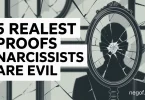The narcissist’s entire identity is a house of cards, meticulously built on illusion. It’s not just that they deceive others they lie to themselves incessantly about who they are and what they stand for. They craft a fragile, artificial self that craves admiration, superiority, and control, guarding this façade with every fiber of their being.
This is why they lash out at criticism, rewrite history to fit their narrative and dodge self-reflection like it’s a plague. The moment someone pierces that illusion, even slightly, they’re confronted with something they can’t bear: reality.
The Misconception of Confidence
Most people assume narcissists are brimming with confidence. They mistake arrogance for self-assurance, manipulation for leadership, and entitlement for strength. But the truth is far darker a narcissist is deeply insecure.
Their psychological framework is a desperate shield against a fundamental truth: they are not the flawless, superior beings they project. When you ask a question that forces them to face this like “Why do you always blame others?” it sends them into a tailspin. They’re not equipped to answer honestly; they’re only wired to manipulate.
The Fear of Being Questioned
For a narcissist, a well-aimed question isn’t just an inquiry it’s a threat. While a healthy person might reflect, even reluctantly, a narcissist can’t afford to. They’ve spent their lives dodging the truth, so they respond with defensiveness, denial, or hostility to avoid the reality your question exposes.
This is why they dread scrutiny. It’s not the question that terrifies them; it’s what it represents: a crack in their carefully curated image, a potential unraveling of the false self they’ve maintained for years, and the revelation of their weakness beneath the bravado.
Related Topics:
How Narcissists Try to Control You?
The ONE THING That Terrifies Narcissists
7 Ways to Torture A Narcissist
How to Torture a Narcissist (Without Losing Yourself)
The Power of a Simple Question
Consider asking a narcissist something straightforward, like “Why do you think nothing is ever your fault?” A grounded person might pause, reflect, and even admit fault. But a narcissist? They’ll retaliate, deflecting blame, attacking you, or twisting the narrative.
Admitting a flaw would mean facing their imperfection, an impossibility for them. This is also why they lean on gaslighting: if they can make you doubt your reality, they can preserve their fantasy. But a precise question that exposes their contradictions strips away their control, leaving them scrambling.
Why People Misunderstand Narcissists
People often misjudge narcissistic behavior, thinking, “If I explain myself better, they’ll understand,” or “If I prove I’m not the enemy, they’ll respect me.” This is a mistake. Narcissists don’t engage in good faith they’re driven by self-preservation, not truth.
Their goal is dominance, and when that slips, they react like cornered animals, clawing to regain control. Your question doesn’t just challenge them it momentarily shatters the spell they’ve cast over you and themselves, revealing the fear behind their mask.
The Art of Exposure
The power of questioning a narcissist lies not just in asking but in what you do next. Argue or explain, and you hand them a lifeline to manipulate their way out. Instead, let the question hang. Watch their reaction their panic, their cracks because that’s where the truth lies. Narcissists don’t fear confrontation or conflict; they thrive on it. What they fear is exposure. One undeniable question can unravel them, not because it changes them, but because it changes how you see them.
The Narcissist’s Self-Destruction
A narcissist’s world hinges on others’ perceptions they’re psychological parasites feeding off validation. When you refuse to play along, their illusion weakens. They might lash out, seek new victims, or double down on denial, but the cracks grow. Exposure doesn’t reform them; it sets their downfall in motion. Their rage, gaslighting, and desperation only hasten the collapse of a persona that can’t withstand reality.
The Truth They Can’t Face
At their core, narcissists aren’t stable. They’re actors without a script once the curtain’s pulled back. Their panic isn’t just about losing control over you it’s about losing the illusion they need to survive. Beneath the grandiosity lies an emptiness they can’t confront. When you expose them, you don’t just reveal their deception to others; you force them to glimpse it themselves. And that’s a battle they can’t win.
Breaking Free
So, the next time you face someone who twists reality and shirks accountability, don’t fight or argue. Ask the right question “Why can’t you ever admit you’re wrong?” and step back. Watch them squirm under the weight of a truth they can’t face. Their power comes from the illusion they convince you to believe. Once you see through it, they lose their hold. The truth, once seen, doesn’t fade and for a narcissist, that’s their undoing.







Leave a Comment